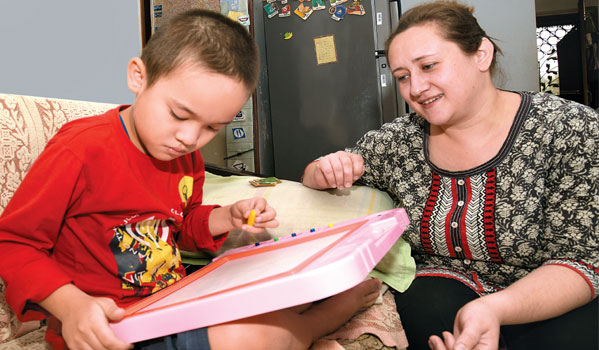The addition of a child to the family is a cause for celebration and joy. It is also the beginning of additional expenses, which one has to bear till the child grows into an adult and is able to manage life independently. Pune-based Ajay and Archana Mishra’s joy at the birth of their son Chaitanya in 2009 came crashing down when, within days, Chaitanya developed visual impairment. Life has not been the same since—34-year-old Archana, a Ph.D in Political Science, gave up her job as a teacher to devote all her time to her son Chaitanya.
Noida-based Bhanu Pande shares a similar experience. “We discovered Tanmay, our son, was autistic when he turned a little over two in 2002,” he recounts. More than 10 million children in India suffer from autism according to a survey by the International Clinical Epidemiology Network Trust (INCLEN). Official figures around autism vary from 1 in 250 to 1 in 500, a condition that results from a neurological disorder that affects normal brain function, impairing communication and social interaction skills. “Initially Tanmay used to get irritated but with time he has calmed down,” adds Pande.

Having a child with special needs could be traumatic to adjust to; the emotional challenges are met with, but the financial realities strike later. A family with special needs children requires extra care to make sure the child has the resources necessary to thrive. Mumbai-based Gopal and Gita Sehjpal, aged 71 and 69, respectively, are an example of what families with special children ought to do. Their 33-year-old son Gaurav was diagnosed with Down’s syndrome and thyroid problem. The couple not only ensured their son did his schooling but also encouraged him to take up jobs that he could manage. “Gaurav worked at a McDonald’s outlet for a while and now helps us with chores at home,” narrates Gita enthusiastically.
Acceptance
The Sehjpals have two daughters who are married and settled, and despite their own advancing age, they have made sure that Gaurav is provided for and not treated any different. Gopal heads his own consulting firm and Gita is a retired lecturer from a government polytechnic and helps her husband in his consulting business. She also devotes time to podsindia.org, a social platform for meeting parents of children with Down’s syndrome. “Podsindia organises seminars for parents and events for children with Down’s syndrome to showcase their talent,” she explains.

Alyona Makarova, mother of 6-year-old Paval Kamei, spends most of her day teaching Paval to manage things on his own. Paval is autistic and was diagnosed at the age of four. “He does not have many friends but likes to see books that have lots of pictures and are colourful,” says Alyona. To ensure that her son picks up skills that will be useful to him when he is older, Alyona has been training at Action for Autism, an organisation that helps parents teach their autistic children on their own.
Unlike the past, when parents with special needs children would themselves stop interacting with the world outside, things have changed for good now. Awareness has increased resulting in society being more helpful and understanding to the situation in which such children find themselves. “Once we figured Tanmay’s condition, it was necessary that everyone around us—friends, relatives, house helps and neighbours—be told about autism,” recounts Pande. In fact, the prevalence of several support groups, both online and offline, has made it possible for families with special needs children to make contact with other parents so that they can collectively manage their lives.
Creating a plan
When it comes to children, needs are never limited and the financial implications only go up when you have a special needs child.
Regular expenses towards medication and special therapy are a given and the emergencies that one could face also need to be factored in. “Gaurav’s monthly expenses, be it medical, music and dance classes, and the fee we pay to the special tutor work out to be Rs 40,000,” says Gita. The Sehjpals are using the services of an investment consultant to help them plan for Gaurav’s and their future finances.
Most financial planners, who counsel families with special needs children, insist that setting up a trust is crucial along with the need for parents to be adequately insured to meet emergencies. Planners also point out that the biggest mistake families make is to put off working out a financial plan and instead use strategies such as relying on well meaning relatives to be the caregivers of their child after their demise. By giving money to relatives to look after one’s special needs child is no guarantee compared to a trust.
“In 2012, I approached a financial planner to understand how we could create a financial support mechanism to meet Chaitanya’s future expenses on medicines and how he will manage after our demise,” recounts Archana. She is a relieved parent with proper financial planning that has helped her in organising her finances to create the necessary money when her son needs it. “I have reworked my Will and am in the process of creating a trust for him,” she adds.
“We are part of a support group, where we are investing towards a community where Tanmay and other children like him can live once we are not around,” says Pande. The centre, Ananda-A Dream, is the first-of-its-kind centre developed by Action for Autism in Gairatpur Bass village in Haryana. This will be a residential and training facility for children diagnosed with autism. There are several other support groups and NGOs that have been working on similar lines, helping families with special needs children find a way out for their children in later years.
Sadly, children with special needs find themselves in a disadvantageous position when it comes to availing financial services; there are hardly any insurance or savings plans that are tailored for their needs. A few insurance policies from LIC existed till a few years ago, targeting families that have children with special needs. However, these have been discontinued, with no replacements in sight. Most insurers we spoke to did not have a clear response to insurance that would work for such children. Under such circumstances, the way out for parents is to plan for not just their retirement but for their child with special needs, who most likely will need financial assistance. “We have bought land in Delhi and plan to construct a house. This will ensure a steady stream of rental income for Paval, forever,” explains Alyona. However simple it may sound, the Kameis will also need friends and relatives who can decide on Paval’s behalf when he is older.

To overcome who decides for the child in the absence of parents can be solved by creating a trust with trustees who will act in the child’s interest. Of equal importance is a letter of intent, which will document everything that the parents want for the child along with a description of the child’s likes and dislikes. There are also schools for special-needs kids, which one must consider for them to get used to being in the midst of other children.
Managing finances with growing children is tough and only gets tougher when you have a child with special needs. Through good financial and estate planning, parents of such kids can avoid many of the pitfalls. “I can’t say it was easy, but it is much easier than what it was a few years ago,” says Archana. By prioritising their finances, parents with special needs kids can ensure that their child is provided with everything he or she may need during his or her lifetime.









